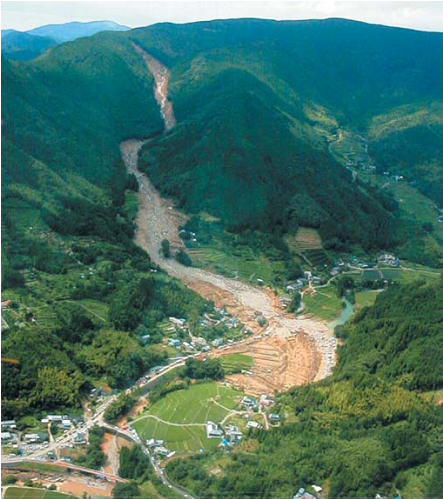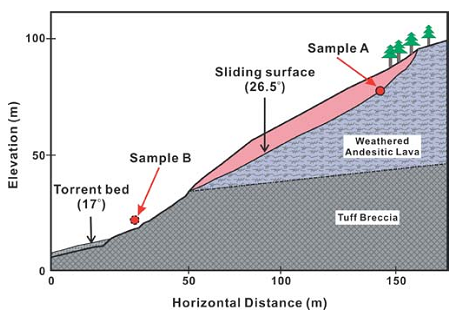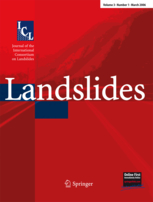Minamata debris flow
LCI : JPN1607131159| Main Information | |
| Landslide Name | : Minamata debris flow |
| Latitude | : 32:12:40 N |
| Longitude | : 130:25:33 E |
| Location | |
| City / District | : Minamata |
| Province | : Kumamoto |
| Country | : Japan |
| Reporter | |
| Reporter 1 | : Khang Dang |
| Reporter 2 | : Kyoji Sassa |
| Landslide Type | |
| Material | : Debris |
| Movement | : Flow |
| Velocity (mm/sec) | : Extremely Rapid |
| Depth (m) | : Moderate-Shallow |
| Slope (degree) | : Moderate |
| Volume (m³) | : Unknown |
| Date of Occurence | |
| Date of Occurence | : Jul 20, 2003 |
| Other Information | |
| Land Use |
Source area : Forest Run-out/deposition area : Farming, Road |
| Other Activity | : Active in the past |
| Triggering Factor | : Rainfall |
| Death(s) & Missing | : 15 |
| Houses and other structural damage | : 15 |
| Photo of landslide | :  |
| Google earth kmz file | : Minamata debris flow.kmz |
| Plan of landslide | : - |
| Cross section of landslide | :  |
| Reference (paper/report) | : http://link.springer.com/article/10.1007/s10346-003-0004-y |
| Testing graph | : |
| Monitoring graph | : - |
| Video of moving landslides including 3D simulation | : - |
| Description | : |
On 20 July 2003, a landslide occurred in an andesitic weathered lava layer on a mountain slope of 31–32 degrees in Minamata City, Kumamoto Prefecture, Kyushu Island, Japan. It was triggered by a heavy rainstorm with 314 mm total rainfall and a maximum rate of rainfall of 91 mm/h. The slide mass entered a torrent, where it was transformed into a debris flow that struck a village along the torrent, destroying 15 houses, killing 15 people, and injuring an additional six people. This debris flow was triggered by the slide, and the landslide mass flowed downstream along the torrent, increasing its volume by entraining material from the channel and weathered surface soils of the mountain slopes on both sides of the channel. Based on a topographic survey made after the landslide occurred, the initial slide was estimated to have occurred along a failure surface with an inclination of 26.5 degrees and depth of approximately 10–12 m. Source: Sassa, K., Fukuoka, H., Wang, G. et al. Undrained dynamic-loading ring-shear apparatus and its application to landslide dynamics. Landslides (2004) 1: 7. doi:10.1007/s10346-003-0004-y |
|




